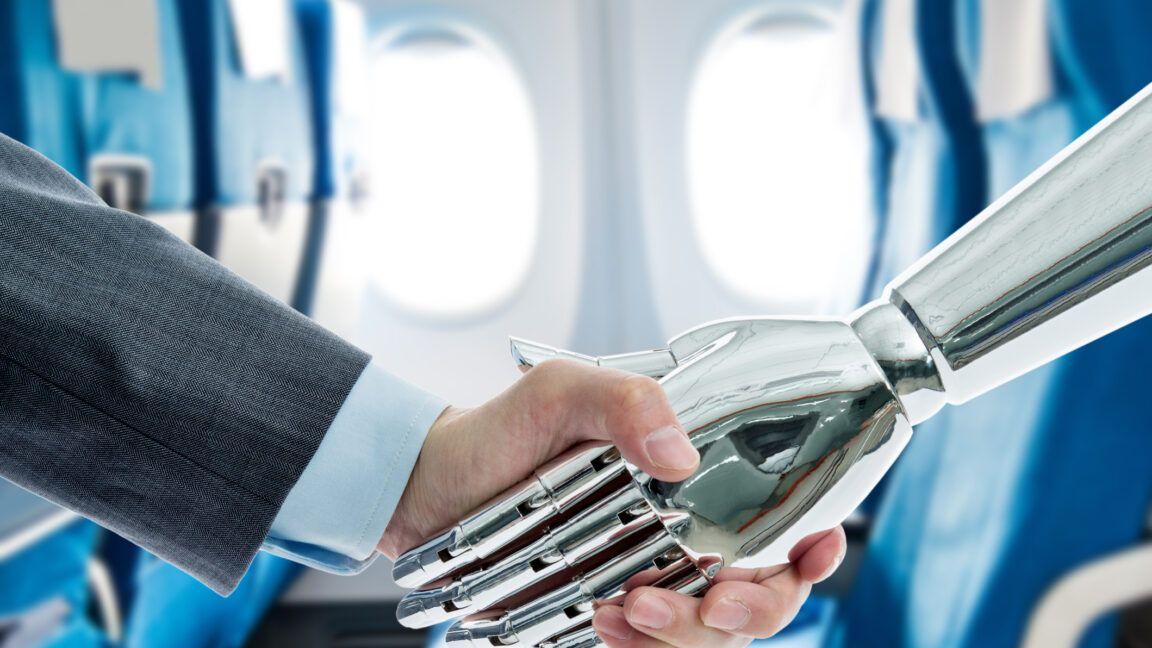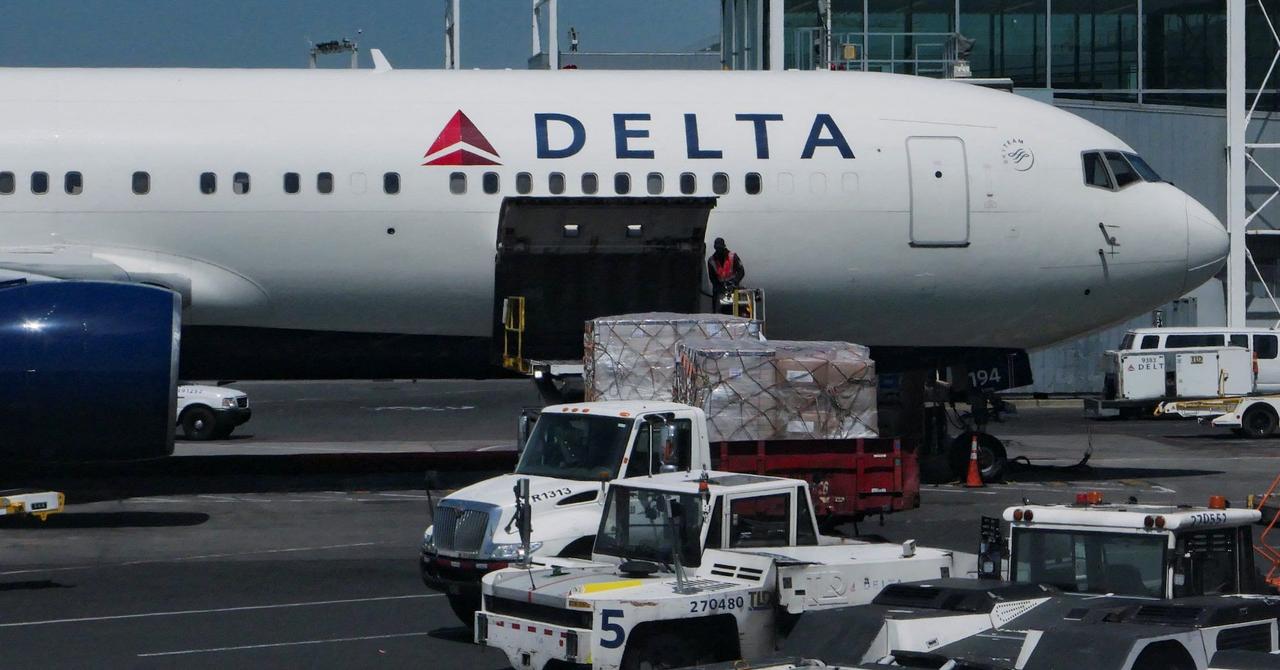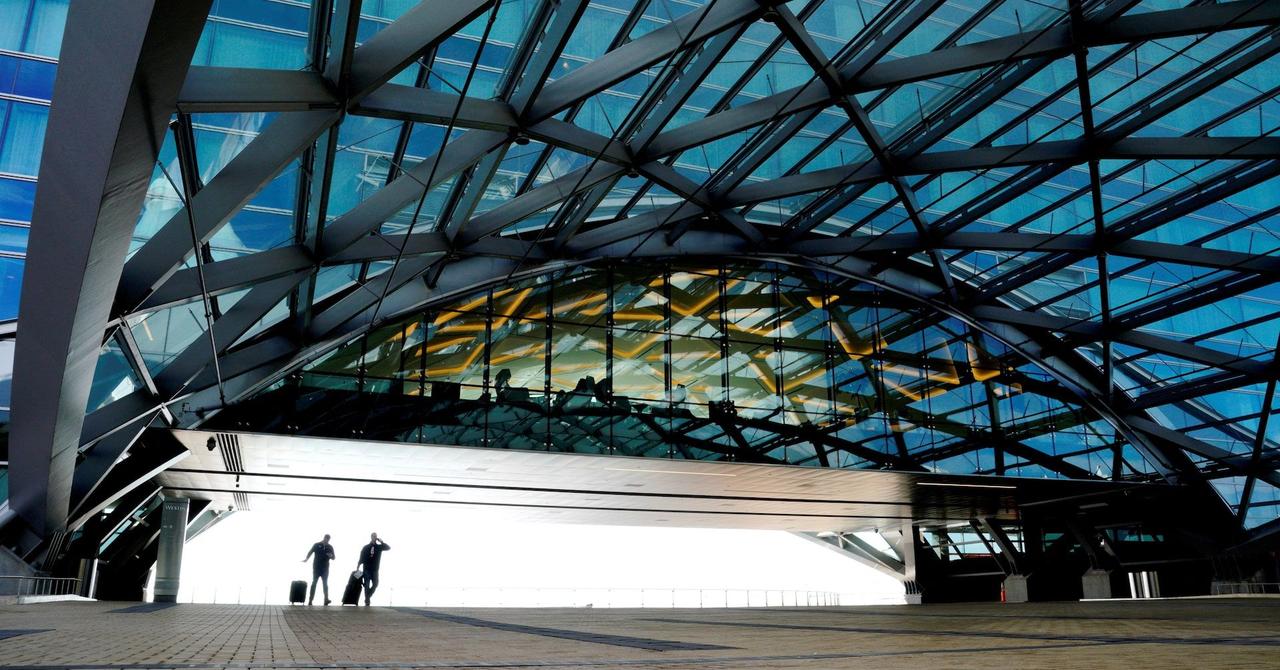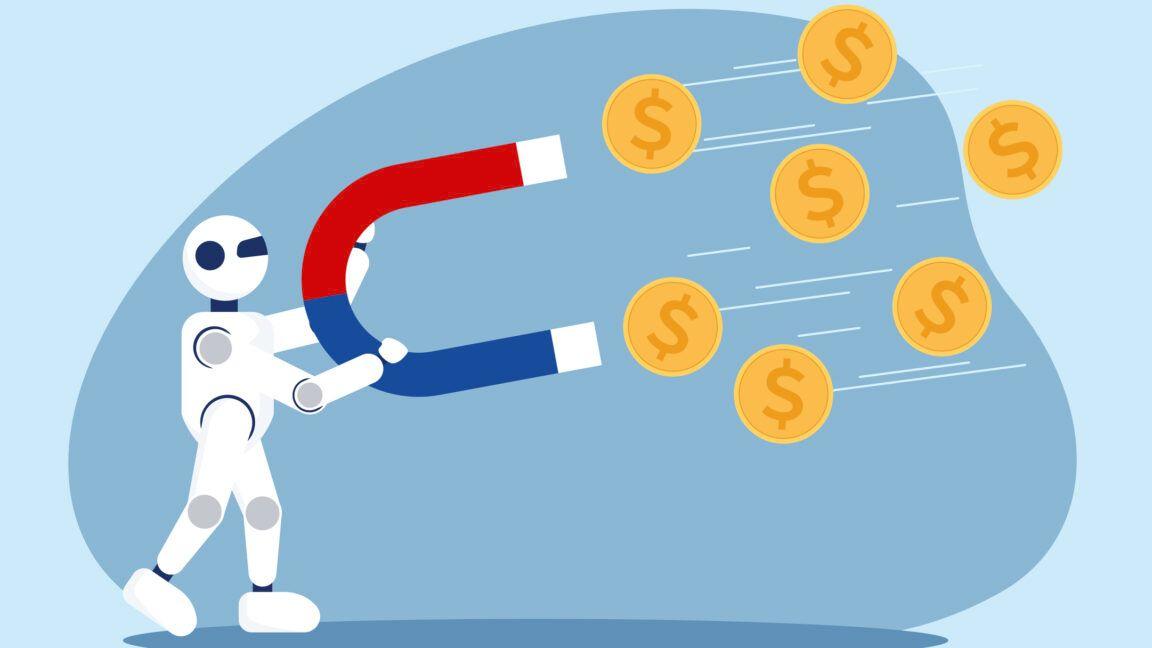Delta Air Lines Embraces AI for Personalized Ticket Pricing, Sparking Controversy and Criticism
10 Sources
10 Sources
[1]
Will AI end cheap flights? Critics attack Delta's "predatory" AI pricing.
Delta has become the first airline to announce that it is using AI to boost profits by personalizing pricing through a pilot program that for months has caused customers to pay different prices for the same flights based on their data profile. Critics have warned that this use of AI goes beyond airline practices that charge people who book flights ahead less than people who book flights at the last minute -- and could ultimately mean the end of cheap flights across the board if other airlines follow. On an earnings call last week, Delta Air Lines President Glen William Hauenstein confirmed that seats on about 3 percent of domestic flights were sold using the AI pricing system over the past six months. By the end of the year, Delta's goal is to boost that to 20 percent of tickets. Consumer Watchdog has warned that while so-called individualized pricing could theoretically be used to lower prices for Delta customers, without public reporting on how the pricing works, it's impossible to know if it's fair or possibly violating federal laws that prohibit charging different rates based on protected classes, like sex or ethnicity. Most often when it's used, "the best deals were offered to the wealthiest customers -- with the worst deals given to the poorest people, who are least likely to have other options," Fortune reported. Last November, Hauenstein told investors that Delta's goal is to eventually get rid of static pricing entirely, Fortune reported, likely motivated even more today based on reportedly "amazingly favorable" results the airline has seen so far. Other airlines may follow its lead, as Delta made it clear to investors that even though the feature is still in a "heavy testing phase," it's working to propel revenue. "We like what we see," Hauenstein told investors on the earnings call. "We like it a lot." George Slover, general counsel for a digital rights group called the Center for Democracy and Technology, warned last fall that tailoring prices based on a customer's "identity, preferences, and situation" could lead airlines to collude to spike prices. His post suggested that Delta may be motivated to leave customers in the dark on their AI models while picking their pockets. So far, Delta has not confirmed when it may release public records showing the pricing variance occurring from its pilot program. "The very fact that Delta is saying that the early results of this intrusive pricing scheme 'show amazingly favorable results' says it all," Slover said in a statement provided to Ars. "They are increasing their profits, and those profits are coming from the consumers they are taking advantage of." Delta has partnered with Fetcherr for the pilot. Fetcherr an Israeli company that "also counts Azul, WestJet, Virgin Atlantic, and VivaAerobus as clients" and plans to expand into other travel industries once its tech becomes established in the airline industry, Fortune noted. Slover expects that for companies wooed with tech like Fetcherr's, the proposition will be "irresistible." Delta declined Ars' request to comment, but a spokesperson told Fortune that the airline "has zero tolerance for discrimination. Our fares are publicly filed and based solely on trip-related factors like advance purchase and cabin class, and we maintain strict safeguards to ensure compliance with federal law." Senator vows to block Delta's AI pricing According to Slover, companies like Delta could vary prices using data like a customer's web-browsing activity, prior purchases, searches for products, or their "income, assets, debts, and financial condition and history." Looking at past purchases could reveal how much they're willing to spend on comparable items, while social data could indicate if, for example, a flight is urgently needed. Any of these data points could "indicate the consumer is more susceptible to sales-pitch puffery or pressure," Slover suggested. Although Delta's AI pricing could increase competition in the airline industry, Slover expects that companies using such pricing schemes are "all too likely" to instead be incentivized "to skew in the direction of higher prices," precisely because of the AI pricing's lack of transparency. "Informed consumer choice is the engine that drives competition; because consumers won't be as informed, and thus will have little or no agency in the supposed competitive benefits, they are more apt to be taken advantage of than to benefit," Slover said. Delta could face backlash as it rolls out individualized pricing over the next few years, Slover suggested, as some customers are "apt to react viscerally" to what privacy advocates term "surveillance pricing." The company could also get pushback from officials, with the Federal Trade Commission already studying how individualized pricing like Delta's pilot could potentially violate the FTC Act or harm consumers. That could result in new rulemaking, Solver said, or possibly even legislation "to prohibit or rein it in." Some lawmakers are already scrutinizing pricing algorithms, Slover noted, with pricing practices of giants like Walmart and Amazon targeted in recent hearings held by the Senate Committee on Banking, Housing, and Urban Affairs. For anyone wondering how to prevent personalized pricing that could make flights suddenly more expensive, Slover recommended using a Virtual Private Network (VPN) when shopping as a short-term solution. Long-term, stronger privacy laws could gut such AI tools of the data needed to increase or lower prices, Slover said. Third-party intermediaries could also be used, he suggested, "restoring anonymity" to the shopping process by relying on third-party technology acting as a "purchasing agent." Ideally, those third parties would not be collecting data themselves, Slover said, recommending that nonprofits like Consumer Reports could be good candidates to offer that form of consumer protection. At least one lawmaker, Senator Ruben Gallego (D-Ariz.) has explicitly vowed to block Delta's AI plan. "Delta's CEO just got caught bragging about using AI to find your pain point -- meaning they'll squeeze you for every penny," Gallego wrote on X. "This isn't fair pricing or competitive pricing. It's predatory pricing. I won't let them get away with this."
[2]
Delta Air Lines is using AI to set the maximum price you're willing to pay
Jess Weatherbed is a news writer focused on creative industries, computing, and internet culture. Jess started her career at TechRadar, covering news and hardware reviews. Delta Air Lines is leaning into dynamic ticket pricing that uses artificial intelligence to individually determine the highest fee you'd willingly pay for flights, according to comments Fortune spotted in the company's latest earnings call. Following a limited test of the technology last year, Delta is planning to shift away from static ticket prices entirely after seeing "amazingly favorable" results. "We will have a price that's available on that flight, on that time, to you, the individual," Delta president Glen Hauenstein told investors in November, having started to test the technology on one percent of its ticket prices. Delta currently uses AI to influence three percent of its ticket prices, according to last week's earnings call, and is aiming to increase that to 20 percent by the end of this year. "We're in a heavy testing phase," said Hauenstein. "We like what we see. We like it a lot, and we're continuing to roll it out." While personalized pricing isn't unique to Delta, the airline has been particularly candid about embracing it. During that November call, Hauenstein said the AI ticketing system is "a full reengineering of how we price and how we will be pricing in the future," and described the rollout as "a multiyear, multi-step process." Hauenstein acknowledged that Delta was excited about the initial revenue results it saw in testing, but noted the shift to AI-determined pricing could "be very dangerous, if it's not controlled and it's not done correctly." Delta's personalized AI pricing tech is provided by travel firm Fetcherr, which also partners with Virgin Atlantic, Azul, WestJet, and VivaAerobus. In Delta's case, the AI will act as a "super analyst" that operates 24/7 to determine custom ticket prices that should be offered to individual customers in real-time, per specific flights and times. Airlines have varied their ticket prices for customers on the same routes for many years, depending on a range of factors, including how far in advance the booking is made, what website or service it's being booked with, and even the web browser the customer is using. Delta is no exception, but AI pricing looks set to supercharge the approach. Delta has taken heat for charging customers different prices for flights, having rolled back the decision to price tickets higher for solo-travelers compared to groups in May. It's not entirely clear how invasive Delta's AI ticketing will be when it analyzes customers to figure out prices, but Fortune notes that it has privacy advocates concerned. "They are trying to see into people's heads to see how much they're willing to pay," Justin Kloczko of Consumer Watchdog told the publication. "They are basically hacking our brains." Arizona Senator Ruben Gallego described it as "predatory pricing" that's designed to "squeeze you for every penny."
[3]
Delta Wants 20% of Flights to Have AI-Powered Dynamic Pricing by the End of 2025
The company calls it "leveraging AI-enhanced pricing solutions." Last year, Delta Air Lines announced it was testing out dynamic pricing on some flights using tools built by the tech company Fetcherr. And while the test was initially limited, executives from the company announced that 3% of flights now use AI pricing, and they hope to sell 20% of all tickets using a dynamic price by the end of the year. Edward H. Bastian, the CEO of Delta, explained the strategy on an investors call last week, noting that it was "optimizing revenue through [its] partnership with Fetcherr," an Israeli tech company founded in 2019, and "leveraging AI-enhanced pricing solutions." "So today, we're about 3% of domestic. And that's... our goal is to have about 20% by the end of the year, and that's a goal," Glen Hauenstein, the president of Delta, told investors on July 10. "I mean, we can report back on what the actual numbers are. But you have to train these models as you might, and you have to give it multiple opportunities to provide different results." Hauenstein said the company was in a "heavy testing phase" but that executives at the company "like what we see." "We like it a lot, and we're continuing to roll it out, but we're going to take our time and make sure that the rollout is successful as opposed to trying to rush it and risk that there are unwanted answers in there," the president said. What does that mean? If you ask critics like Sen. Ruben Gallego, a Democrat from Arizona, it means Delta isn't being fair about the way it's pricing seats. "Delta’s CEO just got caught bragging about using AI to find your pain pointâ€"meaning they’ll squeeze you for every penny," Gallego wrote Tuesday on X. "This isn’t fair pricing or competitive pricing. It’s predatory pricing. I won’t let them get away with this." But the company disputes the idea that there's anything unfair about its use of AI to price fares, telling Fortune magazine, "Our fares are publicly filed and based solely on trip-related factors like advance purchase and cabin class, and we maintain strict safeguards to ensure compliance with federal law.†Dynamic pricing is highly controversial and can lead to some intense backlash. When news broke back in early 2024 that Wendy's was thinking about introducing surge pricingâ€"making food items more expensive during certain times of the dayâ€"it backed off the plan almost immediately. Will Delta face the same backlash? That seems likely, given the subsequent outrage you can see on social media. But that doesn't mean Delta will be as responsive to the negative publicity. Delta makes a significant portion of its revenue from its partnership with American Express, meaning it's less sensitive to people griping about the penny-pinching nightmare that is flying in the 21st century. Or, as the Atlantic put it in an article from 2023, airlines are just banks now. And banks don't really care if you think they're out to just make money without regard for their customers' feelings.
[4]
Delta is using AI-priced tickets to charge the most you'll accept
This AI-based pricing strategy is already being tested and the results have been "amazingly favorable." Fortune reports that Delta Air Lines will be doing away with fixed fares on its flights altogether and will instead start using AI to individualize its fare offers on a per-passenger basis. It's one move as part of a long-term strategy to boost profitability. AI will determine the highest possible price that each individual passenger is willing to pay for their flight ticket. Delta has been piloting the new pricing strategy over the last year, with 3 percent of the airline's fares being set by AI. The results have been "amazingly favorable." Delta now aims to have 20 percent of all fares individually set by AI by the end of 2025. But in the long term, the plan is for AI to completely take over the pricing of Delta's flight tickets. The new pricing scheme has already faced a lot of criticism, with one consumer organization in California accusing the airline of more or less trying to "hack" passengers' brains. However, there are certain laws that the AI must adhere to with its pricing, and US airlines are not allowed to charge differently for flight tickets based on gender or ethnicity.
[5]
Delta moves toward eliminating set prices in favor of AI that determines how much you personally will pay for a ticket
Fresh off a victory lap after a better-than-expected earnings report, Delta Air Lines is leaning into AI as a way to boost its profit margins further by maximizing what individual passengers pay for fares. By the end of the year, Delta plans for 20% of its ticket prices to be individually determined using AI, president Glen Hauenstein told investors last week. Currently, about 3% of the airline's flight prices are AI-determined, triple the portion from nine months ago. Over time, the goal is to do away with static pricing altogether, Hauenstein explained during the company's Investor Day in November. "This is a full reengineering of how we price and how we will be pricing in the future," he said. Eventually, "we will have a price that's available on that flight, on that time, to you, the individual." He compared AI to "a super analyst" who is "working 24 hours a day, seven7 days a week and trying to simulate... real time, what should the price points be?" While the rollout would be a "multiyear" process, he said, initial results "show amazingly favorable unit revenues." Delta accomplishes this pricing through a partnership with Fetcherr, a six-year-old Israeli company that also counts Azul, WestJet, Virgin Atlantic, and VivaAerobus as clients. And it has its sights set beyond flying. "Once we will be established in the airline industry, we will move to hospitality, car rentals, cruises, whatever," cofounder Robby Nissan said at a travel conference in 2022. While Delta is unusually open about its use of AI, other carriers are likely to follow. Already, United Airlines uses generative AI to contact passengers about cancellations, while American Airlines uses it to predict who will miss their flight. "Personalized pricing has been an airline goal for the past decade and a half," Gary Leff, a travel industry authority who first noted Delta's AI strategy, told Fortune. "Delta is the first major airline to speak so publicly about its use of AI pricing, to tout it for its potential upside at its investor day in the fall and to offer concrete metrics around its use in its recent earnings call." Privacy advocates noted Delta's development with concern."They are trying to see into people's heads to see how much they're willing to pay," said Justin Kloczko, who analyzes so-called surveillance pricing for Consumer Watchdog, a California nonprofit. "They are basically hacking our brains." A Delta spokesperson told Fortune the airline "has zero tolerance for discrimination. Our fares are publicly filed and based solely on trip-related factors like advance purchase and cabin class, and we maintain strict safeguards to ensure compliance with federal law." The spokesperson did not immediately answer follow-up questions on what those safeguards were, whether they are human or automated, or where the 3% of fares that are currently set via Fetcherr are publicly filed. To be sure, airlines have long offered different prices to different people, even for the same route, based on factors like how travelers book -- directly, via a comparison-shopping site or a travel agent -- or how far in advance they shop. As far back as a decade ago, travel websites showed different prices for precisely the same itinerary based on details like which browser a purchaser was using to search for fares. But the use of AI supercharges this type of price discrimination and puts airlines into a legal gray area. "AI isn't just optimizing business operations, but fundamentally rewriting the rules of commerce and consumer experience," Matt Britton, author of Generation AI, told Fortune. "For consumers, this means the era of "fair" pricing is over. The price you see is the price the algorithm thinks you'll accept, not a universal rate." White differential pricing is not illegal per se, federal laws prohibit charging different rates to people based on their sex or ethnicity, and the use of some identifiers like ZIP codes have been shown to have a disparate impact on protected classes. Without a public record of all fares, it would be difficult, if not impossible, to determine if Delta is charging vastly different fares to people based on their membership in a protected class. To complicate matters, while industry experts expect the impact of AI to mean more revenue for Delta, the impact for individual passengers is less certain. In the short-term, AI might mean more discounts offered upfront when Delta needs to fill seats, said Leff. Short-term, shoppers might benefit from using a VPN and clearing cookies when browsing for airfares, but long-term, Delta and other airlines might require passengers "to be logged in for purchase of tickets in order to obtain status benefits from an airline, essentially being fully within their ecosystem to gain the benefits of that system (i.e. submit to personalized pricing to get extra legroom seats)," Leff said. Early research on personalized pricing isn't favorable for the consumer. Consumer Watchdog found that the best deals were offered to the wealthiest customers -- with the worst deals given to the poorest people, who are least likely to have other options.
[6]
Delta Announces New System Where AI Makes Up the Price for Your Ticket on the Spot
In the latest sign frivolous and irritating use of AI, US airline Delta is looking to harness the tech to set prices for each individual customer, instead of just listing what they actually cost. As Fortune reports, the airline is looking to push the boundaries of how much passengers are willing to shell out for a plane ticket. By the end of this year, Delta hopes to price 20 percent of its tickets individually, using AI. The practice has already drawn plenty of scrutiny from lawmakers and privacy advocates, with senator Ruben Gallego (D-AZ) calling it out for being "predatory pricing," and accusing Delta of squeezing its customers "for every penny" while "bragging about using AI to find your pain point." In other words, while the concept of "personalized" pricing has been around for quite some time, Delta is painting its dystopian new scheme as a viable long-term strategy to boost profitability -- and of course throwing in AI as a trendy buzzword. It's a troubling new development, indicative of the times we live in. Even grocery chains are touting their AI-driven, Uber-like dynamic pricing schemes, allowing them to gouge their customers by raising prices of goods on the fly through surveillance. And the concert industry, exemplified by Ticketmaster, has leaned into "dynamic pricing" that shakes down music lovers for maximum ticket prices depending on demand. Naturally, Delta has been in damage control mode following the criticism. The company "has zero tolerance for discrimination," a spokesperson assured Fortune. "Our fares are publicly filed and based solely on trip-related factors like advance purchase and cabin class, and we maintain strict safeguards to ensure compliance with federal law." However, it remains unclear what exactly Delta is -- or isn't -- doing to get an AI to determine the price of an airplane ticket. The scheme doubles down on a decades-long practice of taking different factors into account to determine bespoke prices for each customer. The costs of airfare can vary wildly from minute to minute already, due to opaque changes in supply and demand, making for an incredibly frustrating flight booking experience. To critics, AI could make the situation far worse. "AI isn't just optimizing business operations, but fundamentally rewriting the rules of commerce and consumer experience," Matt Britton, author of "Generation AI," told Fortune. "For consumers, this means the era of 'fair' pricing is over." Nobody knows how Delta's latest attempt to cash in on the AI hype will shake out. Could passengers enjoy deep discounts -- or should we expect plane ticket prices to continue to climb?
[7]
Airfare by algorithm: Delta leans into AI pricing -- but is it a good thing?
What you pay for a Delta Air Lines ticket may soon depend less on timing and more on what an algorithm thinks you're willing to spend. About 3 percent of Delta's domestic ticket prices are now determined by artificial intelligence (AI), with plans to raise that to 20 percent by year's end, President Glen Hauenstein said on an earnings call last week. During an Investor Day presentation in November, Hauenstein described the new AI pricing technology as a "super analyst," calling it a "full reengineering of how we price and how we will be pricing in the future." That enthusiasm stems from the airline's partnership with Fetcherr, an Israeli tech company that uses AI to process millions of data points instantly "to set the perfect price every time," according to a company blog post. Delta's embrace of AI is the latest example of dynamic pricing, where companies adjust prices in real time based on factors like supply, demand and even individual consumer behavior. The concept isn't new, but the technology is making it far more sophisticated. Fetcherr's website says its algorithms tailor prices based on factors like customer lifetime value, past purchase behaviors and "the real-time context of each booking inquiry," all of which, the company says, help create "a truly personalized offer." In theory, hyperpersonalization meets customers where they are, offering a custom experience every time. But critics warn that the new pricing tactics may exploit rather than benefit consumers. Sen. Ruben Gallego (D-Ariz.) called Delta's practice "predatory pricing," in a post online, while accusing the airline of using AI to "find your pain point" and "squeeze you for every penny." Last year, Wendy's planned to test an AI-driven dynamic pricing model that many likened to Uber's surge pricing. The plan faced intense backlash online before the burger chain clarified that menu prices would not increase during its busiest hours. It remains to be seen whether Delta will face similar pushback. Airlines already adjust fares based on seasonality and demand, so travelers may be accustomed to seeing wide price swings, with or without AI. NewsNation reached out to Delta for more details about its AI pricing strategy. In response, a spokesperson pointed to the company's latest earnings call. Early results suggest Delta's AI pricing strategy has successfully driven revenue, but it may still be some time before it's the norm. "We're in heavy testing phase. We like what we see," Hauenstein told investors. "But we're going to take our time and make sure that the rollout is successful."
[8]
AI May Determine the Price of Your Next Delta Ticket
Fetcherr is helping Delta do a "full reeingineering" of how it prices, Hauenstein said at the company's Investor Day in November. Struggling to snag the cheap Delta ticket everyone else on your trip got? AI might be to blame. Delta Air Lines (DAL) uses an AI pricing tool on 3% of domestic flights and aims to apply it to 20% by the end of the year, President Glen Hauenstein said on an earnings conference call Thursday. Delta is incrementally deploying technology designed to identify the maximum a traveler will pay because "the more cases we give it, the more it learns," Hauenstein said. Though technically in a "heavy testing" phase, the AI tool -- from the Israeli company Fetcherr -- figures into Delta's plans. Fetcherr functions like a constantly-on "super analyst" and is ushering in "a full reengineering of how we price," Hauenstein said at the company's Investor Day in November. "The initial results show amazingly favorable unit revenues," Hauenstein said in November, according to a transcript made available by AlphaSense. (Fletcherr said at a 2022 conference that its product had been shown to boost revenue 9%, as reported by travel site One Mile at a Time.) Delta wants Fetcherr to set prices and how many seats are available at those prices -- eventually creating what Hauenstein called an "offer management" system. "We will have a price that's available on that flight, on that time to you, the individual-not a machine that's doing an accept-reject, and a static price grid," Hauenstein said in November. After soaring on better-than-expected results Thursday, Delta shares were recently off by about 2% and have fallen 8% so far this year.
[9]
Delta Airlines' shocking AI upgrade: It could soon set ticket prices based on what you can afford
If you've ever paid more than your friend for the exact same Delta flight, the reason might be something much smarter and high-tech than just happening by chance because the culprit is artificial intelligence, as per a report. Delta Air Lines is in the process of using a powerful AI-driven pricing system that could make airfare more personalized than ever before, as per an Investopedia report. During the company's 2024 Investor Day and the second-quarter 2025 earnings call, Delta President Glen Hauenstein revealed that Delta Air Lines is currently using an AI pricing tool on 3% of domestic flights and now plans to expand it to 20% by the end of the year, according to the report. ALSO READ: AeroVironment and Kratos share prices surge over 10% after Pentagon's surprise drone buying spree The AI technology, which is developed by Israeli tech company Fetcherr, is designed to predict exactly how much a customer is willing to pay and set ticket prices accordingly, as reported by Investopedia. Hauenstein described the new AI tool as a "super analyst" that never stops working, according to the report. It doesn't just look at supply, demand, or travel dates, instead, it analyses data to predict each individual customer's maximum acceptable price, as per the report. "The more cases we give it, the more it learns," Hauenstein said during Thursday's earnings call, reported Investopedia. While still in a heavy testing phase, the AI is already shaping pricing decisions and will become a central part of Delta's future strategy, as he even said at the company's Investor Day in November that it is ushering in "a full reengineering of how we price," as quoted by Investopedia. ALSO READ: Want to moonlight and double your income? Head to this Chinese province offering incentives to side hustlers As per a transcript made available by AlphaSense, Hauenstein said in November that "The initial results show amazingly favorable unit revenues," reported Investopedia. While Fletcherr had said at a 2022 conference that its product had been shown to boost revenue 9%, Investopedia reported, citing the travel site One Mile at a Time. Delta expects that Fetcherr will set prices and determine how many seats are available at those prices, which eventually will create what Hauenstein called an "offer management" system, reported Investopedia. Hauenstein said in November that, "We will have a price that's available on that flight, on that time to you, the individual-not a machine that's doing an accept-reject, and a static price grid," as quoted in the report. ALSO READ: NIO stock surges over 4% after Morgan Stanley says Buy following new SUV Onvo L90 launch Why is Delta using AI to set ticket prices? To maximize revenue by offering each customer the highest price they're likely to accept, based on personal data and behavior patterns. Can two passengers on the same flight be charged different prices? Yes, especially if the AI predicts that one traveler is willing to pay more than the other, as per the report.
[10]
Delta will soon use AI to set its ticket prices -- here's what this...
People are turning to AI for couples therapy and money hacks to pay down debt -- now, airlines are relying on it to set ticket prices. The Atlanta-based airline is one of the first of its kind to publicly announce its use of artificial intelligence. Last fall, Delta said it planned to use AI technology to price 1% of its tickets at whatever a customer was willing to pay. Now, reportedly, the airline is hoping to utilize AI to set ticket prices on 20% of its domestic flights by the end of the year, according to The Points Guy. On an earnings call last week, Delta announced that it will test out the tech setting flight prices for approximately 18-24 months to see if it's successful -- and if it is, it seems that the airlines will make it a permanent thing, according to View From The Wing. Ultimately, Delta wants this new change to be in the customer's favor. "[It's] a full re-engineering of how we price, and how we will be pricing in the future. [It's to] get inside the mind of our consumer and present them something that is relevant to them, at the right time, at the right price," Glen Hauenstein, Delta's President, said, according to View From The Wing. The Post reached out to Delta Airlines for a comment. Operating with a customer-first approach is maybe how Delta landed on the list of the best airlines of 2025. According to The Points Guy, the airlines not only took the cake for the seventh year in a row -- but it was also named the most reliable on-time airline in the U.S. "What put Delta over the top in 2025 was its strength across all the categories we analyzed, from the consistently strong, on-time airline operation it runs to the experience customers have at the airport and in their seats," the outlet wrote in their report. Of course, with every good thing comes some bad. Earlier this month, a flap from a Delta Airlines flight on its way to Raleigh-Durham International Airport from Atlanta fell from the sky and landed on a driveway in a North Carolina neighborhood. The flag was "evidently separated" from the left wing, yet the flight managed to have a safe landing once it reached its destination, according to a spokesperson.
Share
Share
Copy Link
Delta Air Lines is implementing AI-powered dynamic pricing for flight tickets, aiming to maximize profits by determining the highest price each individual customer is willing to pay. This move has sparked debates about fairness, privacy, and potential discrimination.
Delta's AI-Powered Pricing Strategy
Delta Air Lines has embarked on a controversial journey to revolutionize its ticket pricing system using artificial intelligence. The airline has announced plans to implement AI-powered dynamic pricing for a significant portion of its flights, aiming to maximize profits by determining the highest price each individual customer is willing to pay
1
.
Source: ET
Glen William Hauenstein, Delta's President, confirmed that seats on about 3% of domestic flights were sold using the AI pricing system over the past six months. The airline's ambitious goal is to increase this to 20% of tickets by the end of the year
2
.The Technology Behind Personalized Pricing
Delta has partnered with Fetcherr, an Israeli company, to implement this AI-driven pricing strategy. Fetcherr's technology acts as a "super analyst" that operates 24/7 to determine custom ticket prices offered to individual customers in real-time, based on specific flights and times
3
.The AI system analyzes various data points, potentially including a customer's web-browsing activity, prior purchases, searches for products, income, assets, debts, and financial history. This information could be used to gauge how much a customer might be willing to spend on a flight
1
.Controversy and Criticism

Source: Futurism
The move towards AI-powered pricing has sparked significant controversy and criticism. Consumer advocacy groups and privacy watchdogs have raised concerns about the fairness and transparency of this pricing model
4
.Justin Kloczko from Consumer Watchdog described the practice as "trying to see into people's heads" and "basically hacking our brains"
5
. Senator Ruben Gallego called it "predatory pricing" designed to "squeeze you for every penny"2
.Legal and Ethical Concerns
While personalized pricing isn't inherently illegal, there are concerns about potential discrimination and violation of consumer protection laws. Federal laws prohibit charging different rates based on protected classes like sex or ethnicity
5
.The Federal Trade Commission is already studying how individualized pricing could potentially violate the FTC Act or harm consumers. This scrutiny could lead to new rulemaking or legislation to regulate or prohibit such practices
1
.Related Stories
Delta's Response and Future Plans

Source: Ars Technica
Delta has defended its pricing strategy, stating that it has "zero tolerance for discrimination" and that fares are based solely on trip-related factors like advance purchase and cabin class
5
. However, the lack of transparency in the AI algorithms has left many skeptical about the fairness of the system.Despite the controversy, Delta seems committed to expanding this pricing model. Hauenstein told investors that the company likes what it sees and plans to continue rolling out the system, albeit cautiously
3
.Implications for the Airline Industry
If successful, Delta's AI pricing strategy could set a new standard in the airline industry. Other airlines are likely to follow suit, potentially leading to widespread adoption of AI-powered dynamic pricing across the sector
5
.This shift could fundamentally change how consumers shop for flights and potentially spell the end of traditional fare structures. As the industry watches Delta's experiment closely, the future of airline pricing hangs in the balance, with significant implications for both airlines and passengers alike.
References
Summarized by
Navi
Related Stories
Delta's AI-Powered Ticket Pricing Sparks Controversy and Scrutiny
23 Jul 2025•Business and Economy

Delta Air Lines Under Scrutiny for AI-Powered Pricing Strategy
03 Aug 2025•Business and Economy

Delta's AI Pricing Controversy: Lawmakers Push Back as Airline Clarifies Stance
26 Jul 2025•Policy and Regulation

Recent Highlights
1
Google Gemini 3.1 Pro doubles reasoning score, beats rivals in key AI benchmarks
Technology

2
Pentagon Summons Anthropic CEO as $200M Contract Faces Supply Chain Risk Over AI Restrictions
Policy and Regulation

3
Canada Summons OpenAI Executives After ChatGPT User Became Mass Shooting Suspect
Policy and Regulation





